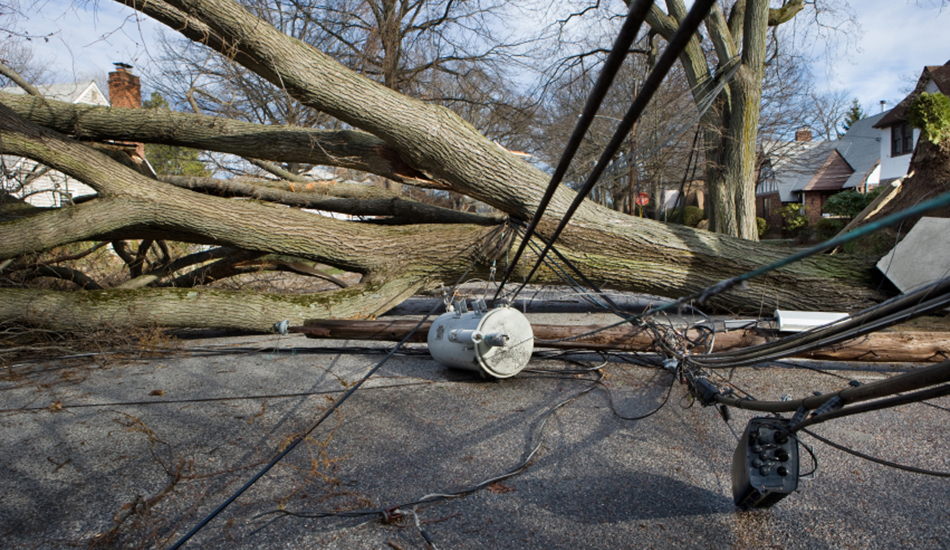Disaster can strike your business at any moment, be it a flood, thunderstorm, high winds or other weather-related events. When that moment arrives, electrical service to your business’ mission-critical systems could potentially be knocked out – for minutes, hours, even days or weeks.
If that occurs, will your business – and all the systems that support it – be equipped to continue operating in the short term, until permanent repairs can be made?
September is National Preparedness Month (NPM), so there’s no better time than now to understand the potential impacts that disasters can have on your business and learn how you can prepare to address them should they occur.
Consider a hypothetical – but entirely possible – scenario: A strong line of thunderstorms moves across Northeast Ohio, bringing with it heavy rains, lightening and high winds. Those winds caused several large tree limbs to fall on nearby power lines, which in turn, severed those lines and knocked power to your space off line.
You now have two fundamental problems: You’ve lost power, and as a result, you may have potentially lost HVAC service as well. A power loss means that computers, HVAC, telephones, alarms and potentially even your fire suppression system are no longer operating. You can’t receive calls from customers or prospects. You can’t make outgoing calls from your wired system. There may be no illumination inside your built space beyond whatever natural light comes through the windows. You can’t transact business through your computers. And with respect to the loss of HVAC service, the building itself starts heating up (if it’s summer) or getting uncomfortably chilly (if it’s winter).
In this case, having a previously installed automatic standby generator at the ready could be a life-saver for your business. An automatic standby generator is a backup electrical system that operates whether anyone is present or not. Within seconds of an outage, it automatically supplies power directly to your business’ electrical circuit breaker box. After utility power returns, the generator shuts itself off and waits for the next outage. It operates on natural gas or liquid propane gas and sits outside just like a central air conditioning unit.
An automatic standby generator is a relatively small up-front investment for retail, office, warehousing or industrial businesses, but it can pay off big in the event of a disaster. Moreover, they only require simple maintenance. All generators, whether they are automatic standby or portable, require periodic oil and filter changes to ensure maximum performance for years of reliable service. Preventive maintenance kits are available, and facility management companies like CLS Facility Services offer annual maintenance contracts for a worry-free ownership experience.
As a reasonable first step, we at CLS recommend that businesses conduct disaster audits with qualified and licensed professionals to determine which mission-critical systems should link to generator power in the event of an outage, and which type of generator solution will work best for those unique needs.
Disasters don’t emanate only from major weather events. Excessive seasonal temperatures or air quality issues could stress HVAC and/or electrical system parts and cause problems. Even time can cause an HVAC disaster; a 20-year-old HVAC unit in the best possible condition is still a 20-year-old unit nearing the end of its useful life.
Late summer heat can tax HVAC systems, sometimes to the point of causing malfunctions, component breakdowns or even system failures. In retail environments particularly, foot traffic is the lifeblood of business. So if HVAC problems do occur in a retail space, that space must somehow continue to be cooled, or customers will likely stay away and business will evaporate as the heat continues to build inside.
Additionally, summertime isn’t the only time when cooling is warranted. Retail stores can retain heat at times throughout the year. The bottom-line goal is customer comfort, so if an HVAC unit isn’t functioning properly, and air doesn’t circulate through the store, portable cooling may in fact be the answer until repairs can be made.
Thankfully, portable cooling can be used to bridge the gap between the time that an HVAC unit experiences problems, and the time that repairs can be scheduled, and ultimately made.
As we near another cold and snowy winter here in Northeast Ohio, you can’t afford to be without heat while HVAC parts are ordered, entire units are shipped, or technicians work through other appointments before getting to yours. You need heat now.
Likewise, companies like CLS provide temporary heating solutions for tenants in retail, office and industrial buildings when units go offline during the winter. These solutions are usually 1-ton heat pumps that can be placed in service areas of a building that requires temporary heat, and plugged directly into a grounded wall outlet. Units larger than 1 ton, up to 5 tons, require 240 volts of electricity to operate (similar to a residential clothes dryer) and therefore require different power outlets.
To inquire about CLS’s disaster prevention services, temporary heating and cooling services, our HVAC services in general, or all other CLS services, please call us at 800-548-3542.




